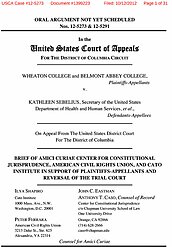Wheaton College v. Sebelius and Belmont Abbey College v. Sebelius
Learn more about Cato’s Amicus Briefs Program.
In January, when the Department of Health and Human Services announced that qualifying health insurance plans under Obamacare would have to cover contraceptives and “morning after” pills, many religious institutions — most notably the Catholic Church — vehemently objected to being forced to fund health care that violates their religious beliefs. More than 30 lawsuits challenging the contraceptive mandate have now been filed across the country by various individuals and religious institutions. Two of those suits have been consolidated for the first appellate argument on the issue: one brought by Wheaton College, a Christian liberal arts college in Wheaton, Illinois, and another brought by Belmont Abbey College, a North Carolina college based around a Benedictine abbey. The legal point here is somewhat technical, but incredibly important for anyone who thinks his freedom of conscience may be violated by the government in the future (a category that includes essentially everyone). As originally promulgated, the contraception mandate included a narrow exemption for religious institutions, one that wasn’t available to religiously affiliated colleges. After the strong backlash against the mandate, HHS issued a “safe harbor statement,” saying that the government wouldn’t enforce the mandate for one year against certain non-profit organizations religiously opposed to covering contraception. In other words, the contraception mandate is still in place but just won’t be enforced — but only for a year and individuals are still free to sue to enforce it against their religiously opposed employers. HHS also issued an Advance Notice of Proposed Rulemaking that announced the department’s consideration of more permanent methods of accommodating religious institutions. Because of the safe harbor notice and the ANPRM, the district court dismissed the colleges’ lawsuits for lack of standing and ripeness — holding that the colleges aren’t currently suffering any injury and it was too early to challenge the proposed rule. Now at the U.S. Court of Appeals for the D.C. Circuit, the colleges argue that they are in fact suffering a current injury and that the mere possibility of a future rule that may accommodate them in some way is too remote to terminate their case. Cato joined the Center for Constitutional Jurisprudence and the American Civil Rights Union on an amicus brief supporting the colleges. We argue that the trial court misapplied the constitutional test for standing by not focusing on the facts that existed at the outset of the case; subsequent government actions, such as the ANPRM, are irrelevant to the preliminary question of standing. We also argue that the trial court’s ruling compromises the principle of separation of powers by giving the executive branch the power to strip a court of jurisdiction merely by issuing a safe harbor pronouncement and an ANPRM (which doesn’t legally bind an agency to act in any way). It is thus entirely speculative whether the agency will alleviate the harms that the colleges are suffering. Without intervention from the courts, therefore, the colleges are left in legal limbo while facing immediate and undeniable harms to their religious freedom: On one hand, they can’t challenge the constitutionality of a final regulation. On the other, they can’t very well rely on a proposed regulatory amendment that may be offered at some unknown point in the future. The trial court rulings in the Wheaton College and Belmont Abbey College cases are frightening examples of judicial abdication that permit the expansion of executive power far beyond its constitutional limits.

This work is licensed under a Creative Commons Attribution-NonCommercial-ShareAlike 4.0 International License.



